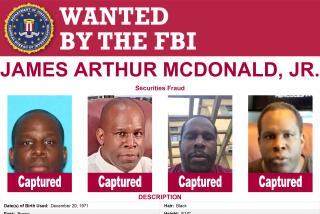Investor Plays Market for Millions (on Paper) : Finances: Caltech student dazzles brokers by winning stock contest. He doesn’t plan to venture onto Wall Street, though, unless he happens to ride his bike there.
- Share via
Four years ago, Bob Maher almost wasn’t accepted by Caltech because of mediocre grades. But he squeezed in, wowing entrance officials by designing a souped-up tricycle that went 40 m.p.h.
This spring, Maher’s unexpected business acumen paid dividends beyond his wildest dreams when he became a paper millionaire by winning the Merrill Lynch Investment Challenge, a college competition entered by students from more than 30 schools across the country, Caltech reported this week.
Maher, who has never made a real investment, won the contest by parlaying a hypothetical $100,000 into $3.3 million in 10 weeks before taxes and brokerage fees. Merrill Lynch officials say Maher set a record and made 10 times as much as any of the other entrants, who included business whizzes from Stanford and the Wharton School of Business at the University of Pennsylvania.
But Maher, 22, who continued his unexceptional academic career by graduating in June from Caltech with a grade-point average of 2.9, out of a possible 4.0, isn’t gunning for the pinstriped canyons of Wall Street. In fact, the Ohio-born economics major turned down a job interview with Merrill Lynch, opting instead to start a marketing firm operated out of his partner’s Encino home.
“You look at people who work in investment banking and they make a lot of money, but a lot of them aren’t really happy and they’re always stressed out,” said Maher, an amiable guy with a sunburned, peeling nose and a passion for cycling.
“After four years of being at Caltech,” he added, “I was tired of being stressed out.”
Instead, Maher intends to focus on his budding company, named ADA ( for “A Different Approach”) Systems, which tries to persuade people to switch from one cellular phone company to another and collects a commission when they do. In his spare time, Maher trains for a grueling, 508-mile bicycle race that will run through Death Valley.
For now, he lives in a concrete box of a student apartment, with two of his racing bikes mounted on his living room wall.
Maher said his strategy was to buy options, in which an investor has the option to buy or sell a stock at a certain price on a future date.
While many entrants used investment banking and finance theories in building their portfolios, Maher and some of the other contestants from Caltech “picked the riskiest things we could find.”
In one gamble, Maher bet heavily that gold-mining stocks would plummet with the release of South African nationalist leader Nelson Mandela because nervous investors, fearing political and social unrest, would dump their gold portfolios in attempts to cash out.
Maher also analyzed individual firms and concluded that the stock of Oracle Systems Corp., which designs computer software programs, was overvalued after five years of sharp growth. Sure enough, in March the firm reported nearly flat net income for its fiscal third quarter, which the Wall Street Journal said caught even financial experts by surprise.
As the contest progressed, Maher began making so much theoretical money that Merrill Lynch thought there was some mistake. But after checking with Caltech economics professors, the company realized Maher just had an uncanny knack for picking winners.
Merrill Lynch executives seemed wistful that they couldn’t sit down with Maher and discuss job opportunities. But Maher “shows a lot of promise in whatever he does; he’s got a real winning attitude,” said program and recruiting manager Karen Lage.
The firm, which has run the competition for the past five years to stimulate student interest in the financial world, rewarded Caltech with $2,500 for its general scholarship fund and $1,000 for its University Investment Club, which gave the money to Maher.
Aspiring stock hounds might want to check out oil and oil-related firms, Maher said, especially with the current political uncertainty in the Middle East. “If oil prices go up, oil-drilling equipment stocks are going to skyrocket.”
But despite his paper successes, Maher isn’t ready to start doling out financial advice in the real world. “I don’t want (anyone) to lose money because of the advice I give,” he said.
As for investing his own money?
“What money?” Maher lamented. “When I have money, I ride; when I run out, I work.”
More to Read
Inside the business of entertainment
The Wide Shot brings you news, analysis and insights on everything from streaming wars to production — and what it all means for the future.
You may occasionally receive promotional content from the Los Angeles Times.








